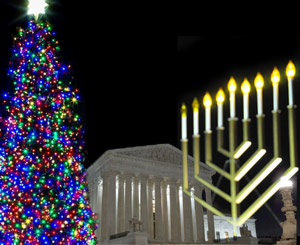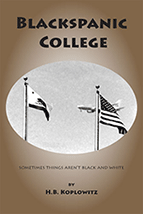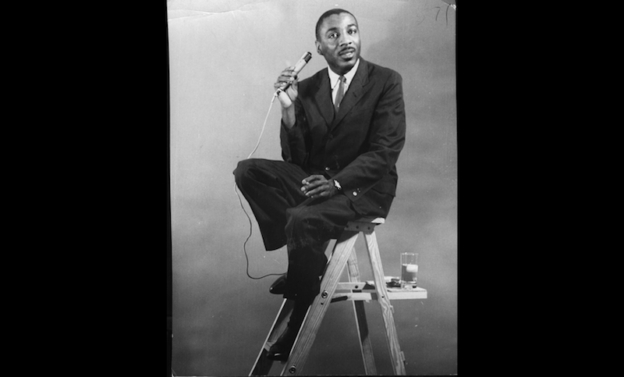© 2007 by H.B. Koplowitz
Since first writing this Christmas story in 2007, I have re-posted it several times. But this year is probably the last because it has become woefully outdated. With recent events in Israel and Gaza, the idea that placing menorahs in holiday displays could symbolize inclusion has run its course. Either the menorahs will disappear or crescent stars will be added, as well they should be. As my outdated story notes, things change.
Sitting in the food court at the Target Center in West Hollywood, playing “Where’s Waldo?” with the holiday display. But it wasn’t hard to find the menorah, because the only other decorations were a quintet of festive wreathes and a single broadleaf tree strung with lights. When we asked a security guard where the Christmas tree was, he referred us to another shopping center. The transformation is complete, I thought. How did it come to pass that instead of putting Christ back into Christmas, they put in Jews?
Even as a Jewish atheist, I have mixed emotions about the menorahs, or more precisely, Hanukiahs, that have become ubiquitous in what used to be called Christmas decorations in public places. Like the letter “K” with a circle around it on certain products in the grocery store, the candelabra has become like a seal of approval that a Christmas decoration is kosher — if not blessed by a rabbi, politically (and legally) correct.
Although it’s not, unless you believe a menorah also represents Muslims, Buddhists and secularists. And Christians, because even if the mall had a Christmas tree, it’s no more a symbol of Christianity than Santa Claus. While crosses and creches are verboten, menorahs are the only overtly religious symbols seen at many public holiday displays that at their core commemorate one of the most significant events in the history of Christianity. “Merry Christmas” has been displaced by the generic “happy holidays,” and it’s become inappropriate to sing “Silent Night” at a public school madrigal, yet de rigueur to toss in “The Dreidle Song,” hardly a fair trade-off. Let’s face it, the Jews have stolen Christmas.
Not that we meant to. I imagine that every time a Christian sees a menorah in a holiday display, the first thing they think is “what’s that?” and then, “oh yeah, it’s a Jewish thing, they must have complained.” It’s as if the religious right, beset by atheists challenging religious displays on public property, decided to use the time-honored tactic of blaming the Jews. Like admitting a token black or female to an all-white men’s club, maybe they figured putting menorahs in Christmas decorations and taking out crosses would placate their critics while motivating their followers — and everyone else not Jewish and not represented in the holiday displays — to hold a good old-fashioned pogrom.
Fundamentalists and right-wing talk show hosts aren’t the only ones to notice that as Christian symbols disappear, those of other faiths and cultures are being added, especially those of “the other white religion.” But why should the Jews take all the heat? How about replacing the star on top of the Christmas tree with a crescent and star and let Muslims be “included” as well.
To get away from menorahs, a few nights later we took a ride through upscale Hancock Park to look at yard and home decorations, which were beautiful as usual. Hancock Park is hardly representative of Los Angeles, just as Los Angeles is hardly representative of America. But after cruising around for awhile, we realized that amongst the reindeer, Santas and Mrs. Clauses, the Christmas trees, snowflakes, gingerbread houses and elegantly lighted trees and shrubs, not only were there no menorahs, but no J.C.s. No crosses, no mangers, no stars of Bethlehem, nothing of a remotely religious nature.
Weird. It’s as if some Christians in America have become like Marranos — Spanish Jews who pretended to be Christians during the Inquisition to avoid torture. Perhaps feeling under siege by secularists, they have become crypto-Christians. But if there’s one time of the year Christians should be unabashedly proud of their religion, you’d think it would be Christmas, which celebrates the birth of the baby Jesus and all the warm and fuzzy Bible stores that go with it, as opposed to Easter, another neat Christian holiday, except for those prickly questions about who did what to whom.
Even as a Jewish atheist, it saddens me to see changes in the traditional American Christmas of my childhood. Say what you will about the Crusades, Inquisition and horny priests, Christians have the best holidays. So much so that my Jewish parents felt that denying my brother and me Christmas was tantamount to child abuse. Despite the religious overtones, as children we had Christmas trees at home, sang Christmas carols at school, sat on Santa’s lap at the mall, opened presents Christmas morning and had Christmas dinner with relatives.
About the time my brother and I figured out Santa Claus wasn’t real, our parents gently told us Jews don’t think Jesus is either, and we began to observe Hanukkah for a few years, although we still exchanged presents on Christmas Eve and visited family on Christmas Day. Because Hanukkah pales in comparison to Christmas. “The Dreidle Song” and most other Hanukkah songs suck, and the holiday drags on for eight days and jumps around from year to year because of the anachronistic Jewish lunar calendar. Except for the lighting of the candles, chanting of prayers and giving of gifts, there aren’t many rituals and traditions associated with the holiday.
Rather than celebrating the coming of a messiah, Hanukkah commemorates an ill-conceived revolt by a band of zealots whose reoccupation of the temple in Jerusalem ultimately resulted in Jewish banishment from the Holy Land for two-thousand years. The miracle of Christmas is the salvation of humankind. The miracle of the Festival of Lights is that when the zealots seized control of the temple, there was only enough olive oil to keep the eternal light lit for one day, but instead it burned for eight. Big whoop.
And while Hanukkah is a week, Christmas is a season, filled not just with Christmas decorations, Christmas trees, Christmas parades, Christmas sales, Christmas movies, Christmas carols, Christmas cards, Christmas parties and Christmas masses, but Christmas cheer and Christmas spirit — peace, charity, faith and family.
While the menorah in the holiday display on government property is about freedom of religion, the menorah on commercial property is about freedom of markets. Capitalists are de-Christianizing Christmas and turning it into what Richard Branson dubbed Chrismahanukwanzakah to spread its commercial appeal to China and developing nations where the religion is less popular and sometimes downright unpopular. Which is also why the menorah in the holiday display is mostly an American phenomenon.
Holidays are always evolving and turnabout is fair play. Big business is merely taking its cues from one of the most successful marketing campaigns of all time, which is the spread of early Christianity. Capitalists are doing to Christians what Christians did to pagans when they turned their customs and traditions into “Christ Mass.” By blending Christmas with other cultures, capitalists convert others to their faith, which is commerce, and elevate their messiah, which is Mammon.
Then again, at most retail outlets, the Christmas spirit still prevails, even if they call it the holiday spirit. And maybe the menorah in the holiday display symbolizes more than tokenism and more than capitalism. Maybe it’s also a reflection of America’s growing recognition, if not complete acceptance, that we have become, indeed, have always been, a multicultural society. In that sense the menorah symbolizes ideals that are as American as they are Christian or Jewish — tolerance, diversity and inclusion. So maybe a kosher Christmas ain’t so bad after all.
-30-






